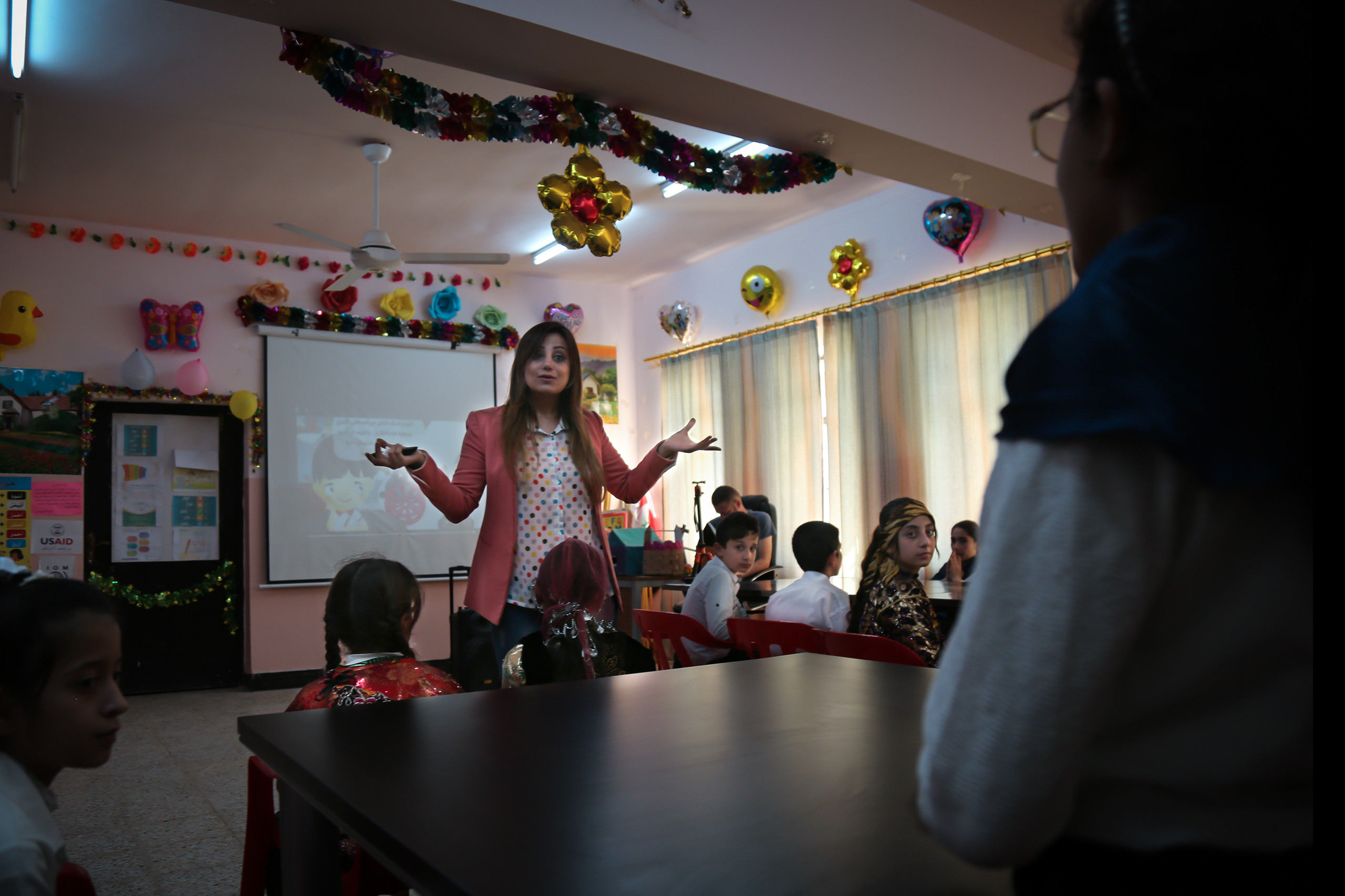4.jpg)
Najla Habib, a school teacher at Zawra primary school in Hamdaniya (Qaraqosh) Photo: IOM
4.jpg)
Najla Habib, a school teacher at Zawra primary school in Hamdaniya (Qaraqosh) Photo: IOM
Filled with hope and enthusiasm, Najla returned to her school to do a job more difficult than the one she used to do: restoring trust among children of different religious and ethnic backgrounds.
Prior to the Islamic State’s arrival in Ninewa’s Hamdaniya district, Najla Habib taught at Zawra primary school, and after the group was ousted she returned with the hope of contributing to the rebuilding of her community’s social aspect.
“Our school is like a smaller version of Iraq, like a colorful flower bouquet. I want to celebrate the ethnic and religious diversity in our school. This is what we need in Iraq, particularly at these times”, says Najla.
According to a report by the International Organization for Migration (IOM), the school where Najla is teaching is located in Hamdaniy, a district in southeastern Ninewa province. The town is inhabited by a mixed make-up of Christians who form a majority along with Ezidi and Shabak minorities. Hamdaniya was retaken from the Islamic State (IS) group in 2016.
.png)
Najla’s friendly relationship with her students Photo: IOM
The impact of IS’s rule and the extremist group’s attempts to ignite discrimination among the different ethno-religious components of the district has affected children’s behavior.
Najla says she soon sensed the traumatizing effects of the war on her students, particularly in their daily interactions.
“Unlike before ISIL, aggressive behaviors, such as cursing and fighting, had become widespread among the students, and there was more tension between the different groups”, indicating that she heard children saying “Are you Christian or Muslim?” or “I don’t want to play with you”.
Najla says she also noted that the students were splitting into Christian and Muslim teams.
Najla explained that she believed this behavioral change was caused by IS’s violence and what these children had to go through during their time in displacement, as many of the displaced families lived under poor conditions. Furthermore, the destruction which IS left behind in Hamdaniyah impacted the returnees.
After her return, Najla decided to do something about her students' behavioral change and set an example for other schools in the district.
“We wanted to change their psychological state to help them build trust and overcome their issues and sensitivities. So, I talked to the school principal and he dedicated a room as a friendly space for psychosocial and mental health support activities”.
.jpg)
In these activities, children read a story together or watch an animation movie and later discuss the story. Some students draw their feelings and post them on the wall to open discussions about how they feel and how to turn negative feelings and emotions into positive thoughts.
“I noticed that the students were drawn to these activities. The activities helped them relax, alleviate stress, and build trust. Additionally, I was able to identify those children who needed special attention”, said Najla.
IOM in coordination with a USAID is working to enhance social cohesion in 12 schools in Hamdaniya through art therapy sessions aimed to prevent segregation and restore trust between communities in the area.
“After six months of activities, the situation changed considerably. One student who did not accept sitting and playing with students from other ethno-religious groups was now interacting, playing, and sharing the same desk with students regardless of their backgrounds”.
Najla Habib emphasizes the importance of these activities for the children, “These children are psychologically shattered and thy really need to participate in such activities.”
Based on Najla’s successful approach, other teachers in Hamdaniya schools are encouraged to follow her example in order to rebuil trust among the different communities.

Najlaa also recalls how her school held its first graduation ceremony last year since people began returning to Hamdaniyah, a sure sign that the schools’ social cohesion activities were having a positive impact.
“It was the most wonderful event when the students wore Qarqoshi clothes, Kurdish and Arabic costumes, and traditional clothes from the Kakayi, Shabaki, and other groups. During the ceremony a Christian and a Muslim student exchanged costumes as a show of love and tolerance”, said Najla as she recalled last year’s graduation ceremony which saw some of her dreams come true.